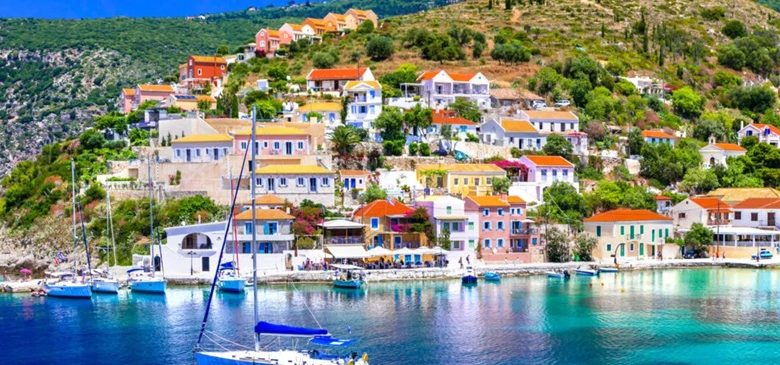Risky Greek Islands to Avoid

With over 6000 islands and islets scattered across the Aegean and Ionian Seas, Greece is a dream destination for island hoppers and beach lovers. Most Greek islands offer gorgeous beaches, charming villages, ancient ruins, and a laidback Mediterranean vibe. However, not all islands in Greece are created equal when it comes to safety and travel risks.
As an avid Greece traveler, I’ve had the pleasure of exploring many Greek islands over the years. While the vast majority left me with amazing memories, a few stood out for the wrong reasons. Based on my experience and research, here are some risky greek islands to avoid due to safety concerns, scams, lack of infrastructure, and other issues.
Mykonos
Mykonos is one of Greece’s most famous islands, attracting hordes of summer visitors with its iconic windmills, whitewashed buildings, and lively nightlife. However, behind the glossy exterior lies an island with a sketchy side. Here are some of the risks to weigh when considering visiting Mykonos:
Pickpockets and Petty Theft
In the busy streets of Mykonos Town and popular beaches, pickpocketing of tourists is rampant. Unsuspecting visitors have had phones, wallets, cameras, and other valuables brazenly stolen in broad daylight. Exercise extreme caution in crowds and be alert in public places.
Overinflated Prices & Scams
As one of Greece’s most touristy islands, Mykonos is notorious for over-the-top prices on everything from hotel rooms to restaurant meals. Vendors and venues have no qualms about charging sometimes double or triple the prices you’d find in other Greek locales. Watch out for bait-and-switch tactics, cover charges for beach chairs that aren’t disclosed upfront, and similar scams.
Dangerous Nightlife Scene
While Mykonos’ nightclubs and beach bars attract a glamorous crowd, they also invite trouble. Tourists have reported instances of adulterated drinks, violence, sexual assault, and injuries. Take extra precautions if partying on Mykonos.
Lack of Enforcement
Despite its popularity, Mykonos suffers from a lack of rule enforcement. Traffic laws, noise regulations, and other codes are routinely flouted without consequence. This creates a chaotic atmosphere that can be off-putting. Don’t expect orderliness and structure on Mykonos.
For travelers seeking an authentic Greek island experience, Mykonos is sadly lacking. Opt for more laidback islands like Paros, Naxos or Milos to avoid the tourist traps and cons.
Zakynthos
The Ionian island of Zakynthos allures visitors with stunning cobalt blue caves and Navagio Beach, arguably Greece’s most beautiful stretch of sand. But with its place on the mass tourism map comes problems like:
Rowdy Party Scene
Fueled by cheap alcohol and nightclubs catering to inebriated travelers, the resort towns of Laganas and Kalamaki on Zakynthos erupt into loud, chaotic parties each night. Fistfights, vandalism and drunk tourists wreaking havoc are not uncommon sights. Not an ideal scene for families or more mature travelers.
Infrastructure Overload
The sheer volume of visitors descending on Zakynthos each summer overtaxes the island’s infrastructure. Blackouts, water shortages, traffic jams, long queues at attractions, and overloaded ferries are common issues. Prepare for crowds and disruption.
Environmental Damage
The massive influx of tourists on Zakynthos has taken a major toll on the environment. Noise pollution, litter on beaches, unregulated development, disturbed sea turtle nesting grounds and traffic congestion are just some of the pressing issues.
High Risks on Boats & Beaches
In recent years, there have been alarming incidents of tourists drowning, getting injured in boats, or suffering accidents on Zakynthos’ beaches. Insufficient lifeguards and lax safety practices are partly to blame. Exercise extreme caution.
For a Greek island experience that’s safer and quieter, pass on crowded Zakynthos in favor of Kefalonia, Paxos or Lefkada.
Santorini
With its iconic whitewashed cliffside villages perched dramatically overlooking a volcanic caldera, Santorini fires the imaginations of travelers all over the world. But is it worth braving the hazards below to visit this Greek island hotspot?
Aggressive Donkey Rides
To reach the old village of Thira from the harbor, many tourists ride donkeys up the steep pathway. But animal rights groups have criticized the Santorini donkey operators over aggressive tactics, overworking the animals, and lack of proper veterinary care. Riding the donkeys supports an unethical industry.
Long Lines & Mobbed Sites
As one of Greece’s most in-demand islands, Santorini suffers from severe over tourism during summer. Expect to wait hours in line just to catch a bus or cable car to town. Popular sites like the towns of Oia and Fira as well as beaches are constantly mobbed. Going anywhere or doing anything takes ages.
Limited Beaches & Facilities
Given its unique geology with steep clifftops, Santorini lacks quality beaches and amenities compared to other Greek islands. You’ll jostle with thousands on the island’s handful of tiny pebble beaches and get stuck with lackluster customer service. Manage expectations accordingly.
Expensive Everything
Outrageous prices are the norm on Santorini. Hotels, meals, activities – you name it, and chances are it will cost far more than other islands. Shop and dine carefully to avoid serious overpayment. Santorini is not a budget island getaway.
For a less crowded version of Santorini’s beauty, head to islands like Milos, Sifnos or Serifos instead. You’ll find all the charm at a more reasonable price.
Kos
As the second largest Dodecanese island, Kos attracts many visitors with its medieval castle, rich history, and long sandy beaches. However, Kos has developed some reputational issues around safety and travel scams:
Aggressive Touts & Scammers
The main town of Kos is notorious for touts aggressively selling boat tours, timeshares, and other offers that often turn out to be shady schemes. Tourists have reported high-pressure tactics bordering on harassment. Always be wary of deals that seem too good to true.
Overdevelopment & Crowds
Much of Kos has been overrun by vast, generic resort complexes catering to package tourists. Expect congestion, crowds, noise pollution and lack of character or authentic Greek atmosphere especially in towns like Kardamena. Mass tourism run amok.
Reckless Partying
Certain areas of Kos like Kavos become party central after hours with drunk tourists acting recklessly and causing problems. Theft, vandalism and violence sour the atmosphere in these zones after dark. Best to avoid if traveling with family or looking for relaxation.
Unreliable Transport
Between infrequent and overcrowded buses, good luck getting around Kos easily without a car or taxi. Even taxis can be problematic with some drivers wildly overcharging or refusing to use meters. Getting stranded is not uncommon.
For a more manageable Dodecanese island experience, opt for chilled-out Patmos or Leros instead of chaotic Kos.
Crete
Greece’s largest, most populous island, Crete is rich in archaeological treasures, breathtaking gorges, and vibrant cities. But Crete’s immense size and popularity come with some caveats for travelers.
Taxi Scams
Unlike other Greek islands, Crete has a persistent problem with dishonest taxi drivers who blatantly try to rip off tourists. Whether it’s tampering with meters, taking circuitous routes to run up fares, or dramatically overcharging on fixed rates, visitors constantly complain about Cretan cabbies. Arrange transport carefully.
Poor Bus Connectivity
Trying to rely on public buses to get around Crete can be extremely frustrating. Aside from limited routes, schedules are erratic at best. Expect long wait times, scarce weekend buses, overcrowding and uncertainty. Consider renting a car for flexibility.
Aggressive Touts & Merchants
In busy tourist areas of Crete like Malia, Heraklion or Chania, you’ll constantly face harassment from overly-persistent restaurant hosts, shop touts and vendors aggressively peddling goods. The pressure borders on bullying and can ruin your visit. Keep walking or firmly decline.
Crime in Resorts
Certain resort towns in Crete have gained reputations for pickpocketing, purse snatching and other petty crimes targeting tourists. Be extra vigilant walking at night, especially around bars and clubs. Leave valuables in your hotel safe.
For a more manageable experience in Crete, base yourself outside the major cities in quieter villages or charismatic cities like Rethymno. You’ll find Cretan hospitality shines through better.
Rhodes
As the capital of the Dodecanese islands, Rhodes charms visitors with its medieval Old Town and imposing fortress. But Rhodes has some hazards for travelers that are helpful to know before visiting:
Mosquitos & Disease
More than other Greek islands, Rhodes has significant issues with mosquitos which transmit diseases like West Nile Virus and malaria in some cases. Pack bug spray and take precautions not to get bitten. The mosquiots are most active dawn and dusk.
Taxi Overcharging
Rhodes is notorious for dishonest taxi drivers who refuse to use meters and dramatically overcharge tourists for rides, sometimes demanding five times the actual rate. Arrange an agreed upon fare before getting into any cab, or use rideshare apps instead.
High Risk of Theft
Pickpocketing and other petty crimes frequently target tourists on Rhodes, especially in crowded places like Rhodes Town, Lindos and beaches. Always secure valuables and be selective about which areas you explore after dark.
Human Waste in Water
Due to irregular sewage treatment and runoff, Rhodes’ waters are not the cleanest. In some areas, untreated human waste poses health risks especially after heavy rains. Research swimming spots carefully and opt for pools.
Consider islands like Symi, Tilos or Karpathos for a similar medieval town experience as Rhodes without the tourist traps and hazards.
4 Tips for Staying Safe on Risky Greek Islands
If you do choose to visit any of the risky Greek islands above, here are 4 tips to stay vigilant and minimize chances of problems:
- Only take taxis with visible meters and negotiate rates upfront. Don’t accept arbitrary pricing.
- Keep valuables secured in hotel safes, avoid bringing expensive jewelry or electronics.
- Do your research and book tours/activities directly rather than buying from a tout on the street.
- Avoid walking alone after dark, only visit bars and nightclubs in groups.
The vast majority of Greek islands live up to their idyllic reputations. By steering clear of the handful of hotspots above prone to tourist troubles, you’re sure to have a safer, more authentic Greek island escape full of charm and hospitality.
FAQs
1. Which Greek islands have problems with crime or pickpocketing?
Mykonos, Crete, Rhodes, Kos, and Zakynthos are among the Greek islands most prone to petty crime like pickpocketing and purse/camera snatching from tourists. Extra vigilance is required.
2. What should I do if a taxi driver on a Greek island tries to rip me off?
Politely refuse to pay an unreasonable fare, point out their lack of a meter, and be firm about agreeing on a fair rate upfront. If they continue to insist, get out of the cab and report them.
3. Are some Greek islands risky for women traveling alone?
Women traveling solo to party hotspots like Mykonos, Malia or Kavos should take extra precautions like avoiding walking alone at night and only taking registered taxis with female drivers if possible.
4. What health and safety risks are there on Greek islands?
Mosquito-borne illnesses, respiratory problems from air pollution, broken sidewalks/stairs causing injuries, undertows and drownings, and alcohol-fueled accidents are some top health/safety risks on islands.
5. How can I avoid problems or scams in Greek island nightclubs?
Take cabs instead of walking to clubs, watch drinks being made and never leave them unattended, avoid accepting drinks from strangers, and travel in a group. Beware offers for free or discounted entry which can be shady schemes.
Conclusion
When planned properly, a trip to the Greek islands promises sunshine, seafood, history, and Mediterranean splendor. However, a small number of hotspots catering to mass tourism have acquired disreputations thanks to crowding, crime, scams, and other hazards. If you’re planning a trip, it’s a good idea to do your research and be aware of the Greek islands to avoid.
By steering clear of islands like Mykonos, Zakynthos, Kos and others on the risky list, you’re free to discover the authentic magic of Greece. Discover a hidden paradise as Greek islands that you have never heard of await you. Opt instead for lesser-visited islands where you can immerse yourself in local culture, savor peaceful beaches, wander charming villages, appreciate ancient sites, and revel in Greek hospitality. With minimal risks and hassles, any of these islands promise an idyllic island-hopping escape.
There’s a perfect Greek island retreat for every taste – skip the over tourism traps, do your research, pack wisely, and don’t be afraid to go a little off-the-beaten path. Allow yourself to fall in love with the real Greece in all its stunning glory!










